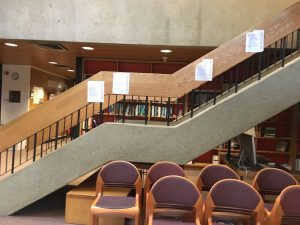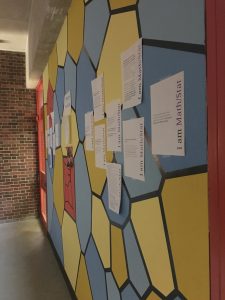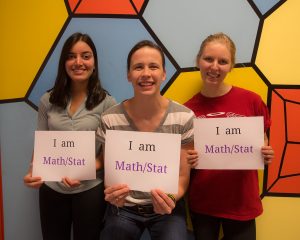Check out this coverage of the panel that AWM and RASAN cohosted this past week!
Applying to REUs – Lena Ji
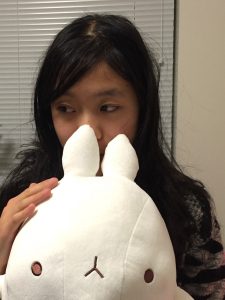 Lena Ji (SMALL ’15) is a second-year graduate student studying algebraic geometry at Princeton. She was sort of clueless when applying to REUs and hopes this post can be somewhat helpful to anyone else in the same position.
Lena Ji (SMALL ’15) is a second-year graduate student studying algebraic geometry at Princeton. She was sort of clueless when applying to REUs and hopes this post can be somewhat helpful to anyone else in the same position.
[Editor’s Note: Lena is one of the smartest mathematicians I know, no matter what she tells you.]
How to Apply to Math REUs
For undergraduates potentially interested in going to graduate school for math or just curious about math research in general, REUs are a great way to gain research experience. I attended two REUs in the past and had a great experience, so I’ve put together this page in hopes that it might be helpful to anyone who’s considering applying. A lot of inspiration for this page came from Alex Lang’s NSF GRFP page, which is an excellent resource if you are a junior and plan to apply for the NSF next year!
Contents:
- What is an REU?
- Outline of Application Process and Components
- Factors to Consider When Applying
- General Tips
- Recommendation Letters
- Personal/Research Statement
- What to Do After You’ve Been Accepted
Disclaimer: All information on this page is based on my limited personal experience, and I make no claims to objective accuracy. If you disagree with anything I’ve written or think I’m wrong about something, please let me know! Any feedback is welcome, and if you want to share personal statements you’ve used in the past that would be super appreciated!
Chapter 3: Impostor Syndrome – Leah Bush ’19
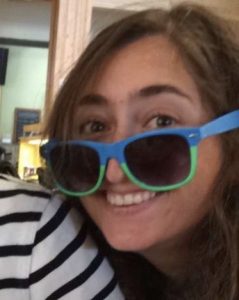
Leah Bush ’19 declared majors in Economics and Math primarily so that she could get enrollment preference in courses in both departments. She also plays tennis, rants about playing tennis, and enjoys playing tennis. She would tell you what she wants to do after college, but she’s just trying to make it through the semester.
When Sarah asked me if I would write a blog post, I was confused––more confused than I am in math classes. Writing a blog post would mean acknowledging I’m a woman in math, I thought. But…but I’m just…
Definition (Impostor syndrome). Suppose some pupil u is an intelligent and capable element of a set in a high-achieving field. We say u has impostor syndrome if u, in spite of their competence, fears being exposed as a fraud.
Theorem. One viable response to impostor syndrome is to own it.
Proof. We show that there exists some u who finds solace in laughing at expectations. For example, let u be me. (It follows that u meets the criteria in the definition because I said so.) Conditional upon sufficient sleep, a strong sense of support, and some other pretty strong assumptions for a typical day during a semester, I can convince myself that others’ beliefs that I am an adequate scholar is such a preposterous assumption that I have no responsibility to live up to it. If I don’t live up to their belief, that’s their mistake, not my failing.1 □
Exercise. What happens when we relax some of the pretty strong assumptions?
Theorem. Impostor syndrome exists along a queer boundary.
Proof. We show that any ball of positive radius around an arbitrary element u in imposter syndrome intersects both a sense that others’ beliefs about u overestimate the true value of u––as shown above––and its complement, that others’ beliefs about u are often belittling. Extensive social science research has shown that the intersection of those most likely to deal with impostor syndrome and those who deal with denigrating and exhausting microaggressions is nonempty. (I accept these robust social science findings as proof in the absence of axioms that allow for a mathematical derivation.) □
Will I acknowledge now that I am a woman in math?
I only took Multivariable Calculus because I thought I was supposed to. I only took Linear Algebra in an attempt to fulfill my Division III requirements without having to take a lab. A gaggle of Econ professors tricked me into taking Applied Real Analysis.
I will always remember flux as liquid bees. (Thanks, Professor Adams.) I will always carry in my head a list of 25 or so if-and-only-if statements on the invertibility of matrices. Even though this was on a problem set I turned in weeks ago, I still think it’s so cool that the union of infinitely many closed sets need not be closed.
My entrymates were genuinely surprised when, after they asked whether I planned to TA for 151, I laughed and said no. I erased half of a proof on a Linear midterm because I didn’t believe that I could figure out a proof on the fly and because I would rather appear humble and wrong than overconfident and wrong; the possibility that I was right didn’t cross my mind until the tests were returned. It excites me every time I work on a problem sets in usually male-dominated study groups and manage to come up with something valuable to contribute, no matter how small.
I am a woman in math.
1Idea comes from Richard Feynman’s Surely You’re Joking, Mr. Feynman.
Gender Representation on Journal Editorial Boards in the Mathematical Sciences
Our advisor, Chad Topaz, recently gave a faculty seminar on his research on gender representation on the editorial boards of math journals. Check out the study he and Shilad Sen completed, Gender Representation on Journal Editorial Boards in the Mathematical Sciences, and read the press coverage here:
- Why Are There So Few Women Mathematicians? (The Atlantic)
- Measuring Gender Representation on Editorial Boards in the Mathematical Sciences (SIAM News)
Some takeaways from his talk:
- Equity, diversity, and inclusion are cornerstone issues in and outside of academia.
- Women mathematicians have been treated horribly for centuries.
- Sophie Germain‘s parents did not think her passion for mathematics was appropriate for a woman, so they took away her warm clothes and fire at night so she couldn’t study math. Eventually, when they kept finding her “asleep at her desk in the morning, the ink frozen in the ink horn and her slate covered with calculations,” they relented and realized she would push through all odds to learn more math.
- Sofia Kovalevskaya could not study in Russia because education was restricted to men. In order to get permission to study abroad, she had to contract a “fictitious marriage” with Vladimir Kovalevskii. She became the first woman in Europe to hold a doctorate in mathematics, but it took her many years to obtain a paid position at a university. As a side note, she may have sustained a romantic relationship with Anne-Charlotte Edgren-Leffler for much of her life.
- Emmy Noether, namesake of Noetherian rings and pioneer in ring theory and theoretical physics, taught at the University of Erlangen’s Mathematical Institute for seven years without pay. Initially, many faculty members resisted hiring her at all, saying, “What will our soldiers think when they return to the university and find that they are required to learn at the feet of a woman?” To this, David Hilbert responded, “I do not see that the sex of the candidate is an argument against her admission as privatdozent. After all, we are a university, not a bath house.” She eventually began receiving a small salary.
- Alice Schafer was the only female math major at the University of Richmond when she attended in 1915, and she was denied access to the university library since women were not allowed. Still, she graduated in high standing and went on the found the Association for Women in Mathematics.
- The percentage of women on journal editorial boards in the mathematical sciences is significantly lower than the percentages of women at lower levels in math.
- 51% of the US population are women.
- 42% of US recipients of BAs in the mathematical sciences are women. (Really, 42%. At Williams, this percentage usually hovers in the 20s. We are that much lower than the national average.)
- 29% of US recipients of doctorate degrees in the mathematical sciences are women.
- 16% of US tenure-stream faculty in the mathematical sciences at doctoral-granting institutions are women.
- 8.9% of editors on editorial boards in the mathematical sciences are women.
- Journals that are “applied” have more women as editors than journals that are “pure” or “both.”
- Editorial boards of “applied” journals are 10.3% women.
- Editorial boards of “pure” journals are 7.2% women.
- Editorial boards of journals that are both “pure” and “applied” are 7.4% women.
- Still, there is some hope.
- The past 11 presidents of the American Mathematical Society have been men, but both candidates on the ballot this year are women!
- The Mathematical Association of America and Society for Industrial and Applied Mathematics both currently have women as presidents.
- The NSF Science and Engineering Indicators point to increased participation of women in science and engineering across all racial and ethnic groups.
- You can help! Here’a an abbreviated list of how to start.
- Take the Harvard Implicit Bias Test.
- Educate yourself.
- Create inclusive classrooms.
- Change policies/procedures.
- Create fair/inclusive professional environments.
- Support AWIS, AWM, AAUW, and more.
- Men: listen, learn, speak up, participate.
Summer Opportunities: REUs
This post focuses on Research Experiences for Undergraduates (REUs), NSF-funded programs where students are paid a stipend to do research at a host institution. Williams hosts one of the largest math REUs, and there are around 50 others throughout the country. (To see a full list, see here, but know that it is not up to date and some of the programs listed do not run every year.) Check out some REUs that AWM members attended this summer!
Emory University REU: The Emory REU is a short program (only six weeks long!), but almost every group manages to submit a paper for publication before the end of it. This is largely due to the projects selected by the mentors which, while challenging, are manageable and lend themselves to presentable findings within the six weeks. Work hours during the day varied by group, but most groups also met in the evenings to work. My group met with our mentors daily, while others met every other day. In general, schedules were very flexible. This was my first mathematical research experience and it was eye-opening to see math in a research context, as opposed to in the classroom setting. The math I learned while working was learned for the sake of utility, not for a test or exam. I found that this motivated learning in a new way, and one that I am excited to take back with me into the classroom this fall. In addition to the research, we also spent time playing games (Mafia and Set), enjoying several outdoor activities around the residential campus (walks around the lake, ultimate Frisbee, and soccer), and celebrating several birthdays. (Anya Michaelson ’19)
Other students who have participated at this REU: Weitao Zhu ’18, Sarah Fleming ‘17.5
Latin@s and Hispanics in Mathematical Sciences
Check out Latin@s and Hispanics in Mathematical Sciences this Hispanic Heritage Month! Professor Pamela Harris and her colleagues have created a calendar running from September 15 to October 15 to showcase the contributions of Latinx and Hispanic mathematicians, both in terms of research and mentoring activities. At midnight every day, a new Latinx/Hispanic mathematician is revealed on the calendar. You can also check out the archive from last year’s calendar!
Reflections on Grad School – Ashwin Narayan ’16
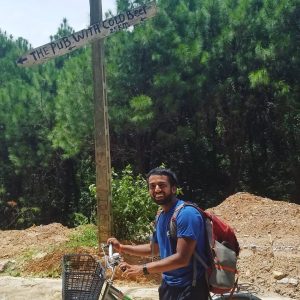 Ashwin Narayan ’16 left Williams with a math and physics degree and found himself in graduate school with little idea of what he was doing. Somehow, he’s muddled his way into his second year of a PhD in applied math at MIT, and he’ll keep going as long as the administration lets him. Here are his reflections on his first year in graduate school.
Ashwin Narayan ’16 left Williams with a math and physics degree and found himself in graduate school with little idea of what he was doing. Somehow, he’s muddled his way into his second year of a PhD in applied math at MIT, and he’ll keep going as long as the administration lets him. Here are his reflections on his first year in graduate school.
The realization that my first year of graduate school had ended only really hit me when I returned from vacation and had to fumble with the keys to my new (and empty) office. The “ziggurat,” a wonderful open-plan maze of cubicles and chalkboards, my home for the last year, was already occupied by the new batch of first-years. The first thought that occured to me was that I’d have to update my Tinder profile: “First year grad student pretending I know things but really subscribing to the ‘fake it til you make it’ doctrine.” As a first-year, impostor syndrome is cute and funny; as a second-year, maybe it’s worrying and sad. With qualifying exams coming up in January, maybe it’s no longer a good idea to answer, “I’m not sure yet …” when someone asks you, “So what type of math do you do?” It’s easy to get overwhelmed by the monumentality of the upcoming challenges, and reflection has always been my way to cope. It’s comforting to look back on what you once thought would be impossible but ended up being completely feasible.
Two years ago, I entered my senior year at Williams with unprecedented levels of self-confidence. The previous semester, I had thrived in Budapest, proving to myself that (a) I could survive in the real world (i.e. without a dining hall) and (b) maybe I was actually decent at math. Then there was a very productive and enjoyable REU experience over the summer which ended with tantalizing whispers of a potential publication. The next steps were obvious: write a thesis that revolutionizes the field, take some more hard classes, go to graduate school next year, draped in flying colors. Then repeat steps one and two. But of course, we remember Of Mice and Men, and this wasn’t even a particularly well-laid plan.
My first indication that I had perhaps over-simplified my future was the GRE subject test in mathematics. After years at Williams, I had forgotten that standardized multiple-choice exams existed, especially in math. I lived for partial credit. And apparently I was pretty terrible at calculus. Getting fewer than half of the questions correct on an exam ostensibly meant to evaluate my competence in the subject I majored in was already demoralizing. But then I stumbled upon this truly awful website where applicants from previous years listed their biodata and the schools they got into. Students who appeared far more qualified than me were getting rejected from schools far less selective than the ones I had set my sights on. Blog posts told me that graduate school was a waste of time unless I was absolutely certain I wanted to go into academia. How could anyone expect a liberal arts student to be absolutely certain about anything? At this point I wasn’t even certain which majors I would be finishing at Williams.
Writing statements of interest compounded the existential dread. Why did I want to go to grad school? Why applied math? What areas of math was I interested in? How was I qualified to attend this program? I couldn’t possibly use the actual answer to those questions. I wanted to go to grad school because I wasn’t ready to go into the real world and couldn’t pay for law or medical school. Applied math because it seemed the most versatile discipline and thus a way to postpone any real decision making. But because I hadn’t actually taken any applied math classes, I had no idea what areas I was actually interested in. And thus I felt in no way qualified for any of the programs I was applying to.
Submit an experience to I am Math/Stat!
Link
Fill out this form to contribute to our I am Math/Stat project!
Sign up for our listserv!
Link
Fill out this form to sign up for our listserv!
Alumni Feature – Anand Hemmady ’17
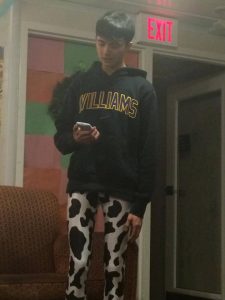
Anand Hemmady ’17 majored in math because he didn’t really know what else to major in. Luckily, the math professors didn’t give him too hard of a time, so he somehow graduated. Here are his reflections on his time at Williams.
I didn’t intend to major in math when I got to Williams. Math was something I usually enjoyed but also wasn’t very good at, which made me think I should look for something else to major in. Unfortunately, I felt similarly about every other subject, so I really had no clue what to study. I figured I would just take some math classes anyway, since I heard that the professors were great, and I knew that math would be useful no matter what I ended up majoring in.
During my first two years, when I didn’t always feel comfortable at Williams, math felt like a world where things made sense. Well, I take that back – math rarely made much sense. But I found that, with enough effort and badgering of professors during office hours, things started falling into place. You know that feeling of re-visiting something you once thought was impossible to understand, and all of a sudden it seems intuitive and natural? I got to experience that every once in a while, and those moments of understanding are my fondest academic memories. Of course, for every such moment of clarity were thousands of moments of feeling lost, but math taught me to become comfortable with not knowing things, and to keep striving for understanding. My relationship with math hasn’t changed much from when I started college. It’s still something I usually enjoy, and it’s still something I’m not very good at. Somehow, my experiences at Williams allowed me to embrace the former and make peace with the latter. After that, it felt like a no-brainer to major in math.
What really caught me by surprise was the dedication and compassion I felt from the math professors. Every professor I had held office hours more often than they needed to and went out of their way to make sure that we got the support we needed. Many also made it a point to make personal connections with us. I felt this most when I got a concussion the day before the spring semester of my senior year. All of my professors immediately told me to take my time to get better and were happy to let me turn assignments in late. As much as they cared about my math education, they cared more about my wellbeing as a person, and that’s something I really appreciate.
Looking back, I’m really thankful that I chose to major in math. I made so many close friendships, both with fellow students and professors, through the math/stats community, which became a sort of second home for me while at Williams. I guess that’s why I regret not doing more to make the community more welcoming to all. As a cisgender male, I knew that my experiences within the department weren’t representative of how everyone else felt. I regret not being a better ally. I’m a pretty shy person, and I was always scared to speak up about these sorts of issues. I did what I could while trying not to make much noise. I tried to listen to people without judging and let them know that I was there for them, and I did my best to talk less in class in order to let other people participate. I know I could have done more though. I’m still trying to understand what it means to be an ally and how to empathize from my position of privilege without being patronizing. I wish I began that process earlier in my undergraduate years.
That’s just one of the many reasons why the AWM is such an invaluable addition to the Williams math/stats community. Getting to know members of the AWM and attending one of their dinners helped me reflect on my privilege and understand the courage it took for non-cisgender males to simply exist in the math community. Everyone in the AWM is also just really, really cool, so I appreciated getting to spend more time with all of them. I hope that everyone who is interested in diversity and representation within the math community gets a chance to interact with the AWM. That being said, us cisgender males have to be mindful that the AWM is, first and foremost, a space of solidarity for individuals of other gender identities, and we must make sure that we don’t take up too much space at AWM meetings and events. I’m convinced that we can do this in a respectful and thoughtful way, and in doing so, become better allies ourselves, while maintaining the integrity of the space that the AWM provides.
To any students who are reading this, I hope you take a chance and enroll in some math courses. I hope you find them as enriching and welcoming as I did. If you don’t feel at home in the department, though, or if you ever feel uncomfortable about something, I hope you remember that spaces like the AWM are there for you, full of amazing and kind people who have gone through what you are going through, and who have made it through with their love for math (mostly) intact.

